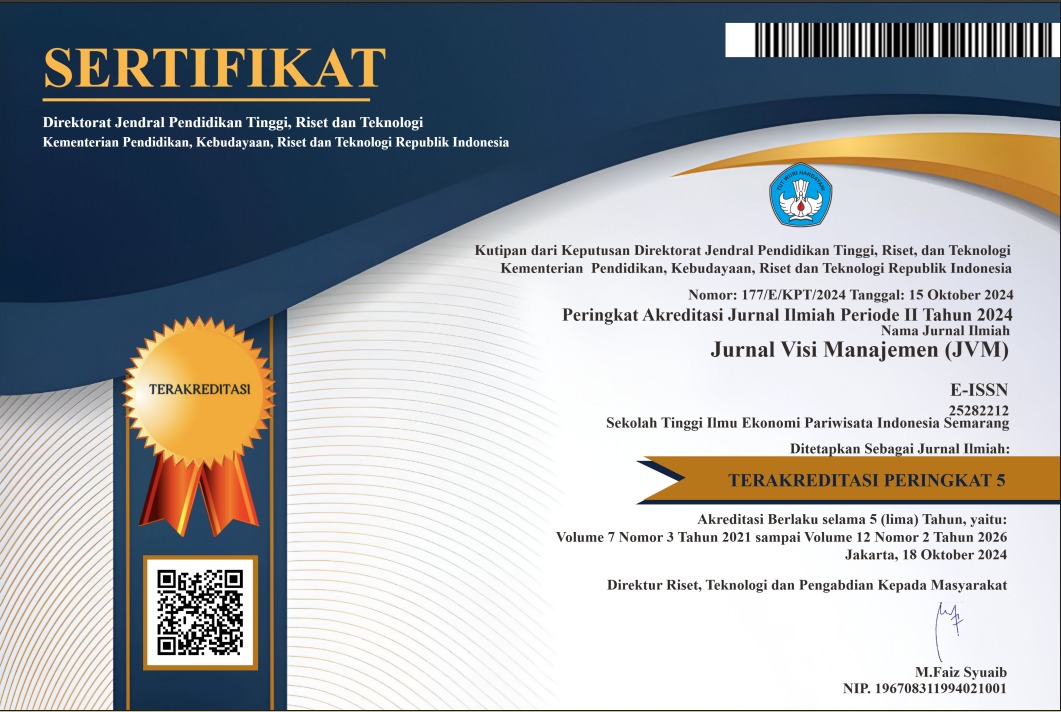Dampak Digitalisasi terhadap Inovasi Teknologi pada Usaha Mikro, Kecil, dan Menengah
DOI:
https://doi.org/10.56910/jvm.v10i2.523Keywords:
Digitalization, Technological Innovation, MSMEsAbstract
This study aims to examine the impact of digitalization on technological innovation in Micro, Small, and Medium Enterprises (MSMEs) through a qualitative literature review approach. In the era of digital transformation, MSMEs face various opportunities and challenges. Digitalization has the potential to enhance MSMEs' competitiveness by accelerating product, service, and business process innovation, but it also requires them to overcome limitations such as limited technological skills and financial constraints. By analyzing previous studies using the bivariate probit model, this study finds that digital technology adoption is positively correlated with increased innovation in MSMEs. Digitalization has been shown to expand market access, improve operational efficiency, and strengthen MSMEs' adaptability to changes in the business environment. However, internal and external barriers, such as low digital literacy and limited funding access, remain significant obstacles. This study emphasizes the importance of support from the government and related institutions in providing training and funding access so that MSMEs can fully leverage digitalization for sustainable innovation.
References
Abdelaty, H., & Weiss, D. (2021). R&D capacity and the innovation collaboration paradox: The moderating role of the appropriation strategy. Innovation: Organization & Management. https://doi.org/10.1080/14479338.2021.1971992
Abou-Foul, M., Ruiz-Alba, J. L., & Soares, A. (2021). The impact of digitalization and servitization on the financial performance of a firm: An empirical analysis. Production Planning & Control, 32(12), 975-989. https://doi.org/10.1080/09537287.2020.1780508
Agostini, L., Nosella, A., & Soranzo, B. (2020). The digitalization of the innovation process: Challenges and opportunities from a management perspective. European Journal of Innovation Management, 23(1), 1-12. https://doi.org/10.1108/EJIM-11-2019-0330
Akhtar, P., Khan, Z., Tarba, S. Y., & Jayawickrama, U. (2018). The internet of things, dynamic data and information processing capabilities, and operational agility. Technological Forecasting and Social Change, 136, 307-316. https://doi.org/10.1016/j.techfore.2017.04.023
Alhusen, H., & Bennat, T. (2021). Combinatorial innovation modes in SMEs: Mechanisms integrating STI processes into DUI mode learning and the role of regional innovation policy. European Planning Studies, 29(4), 779-805. https://doi.org/10.1080/09654313.2020.1786009
Anderson, C. (2008). The end of theory: The data deluge makes the scientific method obsolete. Wired Magazine, 16(7). https://www.wired.com/2008/06/pb-theory/
Ardito, L., et al. (2021). Technological Forecasting and Social Change, 191, 122474. https://doi.org/10.1016/j.techfore.2023.122474
Awais, M., Kabir, A., & Rehman, A. (2021). Collaboration and innovation in the digital age for SMEs. Technology Innovation Management Review, 11(9), 45-53.
Barton, D., & Court, D. (2012). Making advanced analytics work for you. Harvard Business Review, 90(10), 78-83.
Booth, A., Sutton, A., & Papaioannou, D. (2016). Systematic approaches to a successful literature review. SAGE Publications.
Bouwman, H., et al. (2019). Technological Forecasting and Social Change, 140, 82-94.
Braun, V., & Clarke, V. (2006). Using thematic analysis in psychology. Qualitative Research in Psychology, 3(2), 77-101. https://doi.org/10.1191/1478088706qp063oa
Camisón, C., & Forés, B. (2018). Efficiency and risk reduction through digitalization in SMEs. International Small Business Journal, 36(4), 400-414.
Chatzithomas, L., Gatzoyiannis, A., & Papadopoulos, S. (2021). Digital transformation and market reach for SMEs. International Journal of Business Studies, 58(2), 134-148.
Chavez, R., et al. (2017). Supply Chain Management: An International Journal, 22(2), 132-144.
Coleman, S., et al. (2016). Computers in Industry, 82, 94-102.
Ekawahyu Kasih, Farah Qalbia, & Novrizal Novrizal. (2022). Empowering talent in the age of artificial intelligence: Innovations in human resource management. In The International Conference on Education, Social Sciences and Technology (ICESST), 1(2), 287–295. https://doi.org/10.55606/icesst.v1i2.383
Grant, M. J., & Booth, A. (2009). A typology of reviews: An analysis of 14 review types and associated methodologies. Health Information & Libraries Journal, 26(2), 91-108. https://doi.org/10.1111/j.1471-1842.2009.00848.x
Gruber, H. (2019). Proposals for a digital industrial policy for Europe. Telecommunications Policy, 43(2), 116-127. https://doi.org/10.1016/j.telpol.2018.06.003
Hall, P., & Williams, D. (2020). Challenges and opportunities in digital adoption by SMEs. Journal of Digital Innovation, 25(3), 234-250.
Hervas-Oliver, J. L., et al. (2021). The drivers of SME innovation in the regions of the EU. Research Policy, 50, Article 104316.
Kitchenham, B., & Charters, S. (2007). Guidelines for performing systematic literature reviews in software engineering. Technical Report EBSE-2007-01, Keele University and University of Durham.
Lee, & Schmidt. (2016). Using value chains to enhance innovation. Production and Operations Management, 26, 617-632.
Liu, et al. (2019). Cloud-based big data analytics for customer insight-driven design innovation in SMEs. International Journal of Information Management, 51, Article 102034. https://doi.org/10.1016/j.ijinfomgt.2019.11.002
Love, J. H., & Roper, S. (2019). Digital collaboration and SME innovation performance. Research Policy, 48(1), 90-102.
Muhammad Rizal, Ruslaini Ruslaini, & Eri Kusnanto. (2022). Peran regulasi dalam mendorong adopsi cloud computing UMKM DKI Jakarta. Journal of Business, Finance, and Economics (JBFE), 3(1), 130–136. https://doi.org/10.32585/jbfe.v3i1.5707
Nguyen, H. T., Bui, V. C., & Pham, T. P. (2023). Barriers to digital adoption in developing countries. Journal of Entrepreneurship and Public Policy, 12(3), 298-314.
Radicic, D., & Petković, S. (2023). Impact of digitalization on technological innovations in small and medium-sized enterprises (SMEs). Technological Forecasting and Social Change, 191, 122474. https://doi.org/10.1016/j.techfore.2023.122474
Ruslaini Ruslaini, & Muhammad Rizal. (2022). Adopsi cloud computing UMKM DKI Jakarta: Peran kesiapan teknologi dan pembelajaran organisasi. Journal of Business, Finance, and Economics (JBFE), 3(1), 45–52. https://doi.org/10.32585/jbfe.v3i1.5692
Shapira, P., Youtie, J., & Kay, L. (2022). The role of digitalization in enhancing SME innovation capabilities. Journal of Small Business Management, 60(4), 781-799.
Snyder, H. (2019). Literature review as a research methodology: An overview and guidelines. Journal of Business Research, 104, 333-339. https://doi.org/10.1016/j.jbusres.2019.07.039
Tan, T. K., Wang, X., & Li, Z. (2020). Digital adoption and business adaptability in SMEs. Small Business Economics, 55(2), 331-346.







